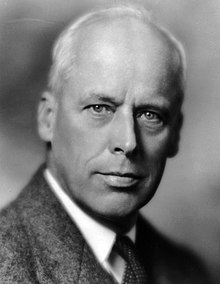Norman Thomas
| Norman Thomas | |
|---|---|

Thomas in 1937
|
|
| Personal details | |
| Born |
Norman Mattoon Thomas November 20, 1884 Marion, Ohio |
| Died | December 19, 1968 (aged 84) Cold Spring Harbor, New York |
| Political party | Socialist |
| Spouse(s) | Frances Violet Stewart (m. 1910-1947; her death) |
| Children | 5 |
| Parents | Emma Williams Mattoon Weddington Evans Thomas |
| Alma mater | Princeton University |
| Occupation | Political writer, activist |
| Religion | Presbyterian |
Norman Mattoon Thomas (November 20, 1884 – December 19, 1968) was an American Presbyterian minister who achieved fame as a socialist, pacifist, and six-time presidential candidate for the Socialist Party of America.
Thomas was the oldest of six children, born November 20, 1884 in Marion, Ohio, to Emma Williams (née) Mattoon and Weddington Evans Thomas, a Presbyterian minister. Thomas had an uneventful Midwestern childhood and adolescence, helping to put himself through Marion High School as a paper carrier for Warren G. Harding's Marion Daily Star. Like other paper carriers, he reported directly to Florence Kling Harding. "No pennies ever escaped her," said Thomas. The summer after he graduated from high school his father accepted a pastorate at Lewisburg, Pennsylvania, which allowed Norman to attend Bucknell University. He left Bucknell after one year to attend Princeton University, the beneficiary of the largesse of a wealthy uncle by marriage. Thomas graduated magna cum laude from Princeton University in 1905.
After some settlement house work and a trip around the world, Thomas decided to follow in his father's footsteps and enrolled in Union Theological Seminary. He graduated from the seminary and was ordained as a Presbyterian minister in 1911. After assisting the Rev. Henry Van Dyke at the fashionable Brick Presbyterian Church on Manhattan's Fifth Avenue, Thomas was appointed pastor of the East Harlem Presbyterian Church, ministering to Italian-American Protestants. Union Theological Seminary had been at that time a center of the Social Gospel movement and liberal politics, and as a minister, Thomas preached against American participation in the First World War. This pacifist stance led to his being shunned by many of his fellow alumni from Princeton, and opposed by some of the leadership of the Presbyterian Church in New York. When church funding of the American Parish's social programs was stopped, Thomas resigned his pastorate. Despite his resignation, Thomas did not formally leave the ministry until 1931, after his mother's death.
...
Wikipedia
